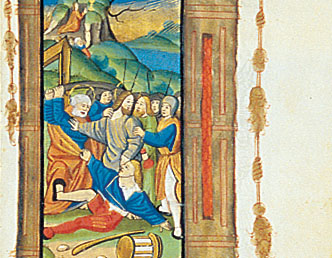All four Gospels tell of how the High Priest’s servant got his ear cut off when Jesus was arrested. The synoptics don’t mention names and it is sensibly surmised that this is because Peter would have been in even more trouble if they had openly named him.
 John however names both Peter and the servant, Malchus. John was a relative of Caiaphas and Annas so he was probably in the know as to the names, but there is something about the deliberate way John says “The servant’s name was Malchus” that struck me yesterday when the Gospel was being read.
John however names both Peter and the servant, Malchus. John was a relative of Caiaphas and Annas so he was probably in the know as to the names, but there is something about the deliberate way John says “The servant’s name was Malchus” that struck me yesterday when the Gospel was being read.John understood the Jewish view of the power of names-of course. Malchus means counsellor or king. Oh the irony. While John is the only one of the writers to call Malchus by name (and name Peter as the sword swinger) so Luke the Greek physician is the only one to record that Jesus healed the sliced ear.
Outside of the Gospels though I don’t think we hear of Malchus again. There doesn’t appear to be a St Malchus and yet he seems like someone who would have become Christian in the end. He has heard both sides of the story. On the one side is the High Priest and the Temple who having waiting all this time for a Messiah don’t want the one on offer, and on the other side if the Gospel message Jesus brings. Malchus gets to choose his High Priest.
Jesus seems to make it remarkably easy for him.
The men arrive with Judas and Jesus asks them who they are looking for. “Jesus the Nazerene,” they say and He says “I AMHe.” At this John tells us they stepped back and fell to the ground. The implication is the power of the Word the “I AM” caused this. So Malchus ends up on the ground because of the Name of God.
After this Malchus gets his ear cut off and Jesus heals it back.
None of this makes any difference and Jesus is arrested and hauled off to the High Priest.
Caiaphas is in an interesting position. He is High Priest sitting on the seat of Moses and therefore God speaks through him in a way. I suspect-but I haven’t read anything on this, that just as the Pope is infallible (through Peter’s seat)-that is protected from teaching error in faith and morals, so was the High Priest. He has said “One man must die for the people”
Jesus is crucified and then there is the Sabbath when all is silent.
The apostles went back to the Upper room to hide out and feel sorry. NOT ONE of them went off with the women on Sunday morning to see if He had risen. They didn’t seem to believe He would.
Interestingly though Caiaphas had been listening and understood Jesus promise to rise all too well and wanted to make sure it didn’t happen. He sent guards to the tomb to make sure no one stole the body.
So what happens to Malchus? Who does he listen to once that ear is healed? We are not told and the silence on it bothers me. There are no legends from long ago, that I can find, that tell us Malchus was baptised.
Was he at the foot of the cross making sure the deed was done? Did he see the darkened sky, and feel the earthquake. Surely he saw the huge lintel above the Holy of Holys broken in two, ripping the great curtain from top to bottom.
But none of this appears to have moved him.
It seems that despite hearing what Jesus had to say, despite seeing up close and personal the spite and fear of Caiaphas; despite the miracles he witnessed and even received, Malchus never believed.






 John however names both Peter and the servant, Malchus. John was a relative of Caiaphas and Annas so he was probably in the know as to the names, but there is something about the deliberate way John says “The servant’s name was Malchus” that struck me yesterday when the Gospel was being read.
John however names both Peter and the servant, Malchus. John was a relative of Caiaphas and Annas so he was probably in the know as to the names, but there is something about the deliberate way John says “The servant’s name was Malchus” that struck me yesterday when the Gospel was being read.